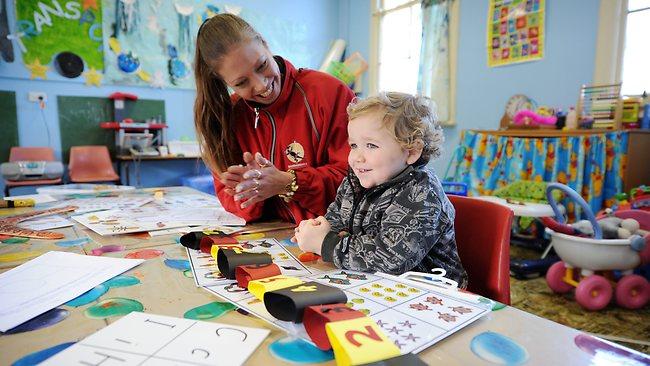Early education is child's play for indigenous kids
BY the time Eric, 2, starts school, he will already be familiar with the sound of the bell, the classroom and even teachers.

BY the time two-year-old Eric Riley starts school, he will already be familiar with the sound of the bell, the classroom and even some of the teachers, as well as lining up for assembly.
Importantly, Eric will have basic literacy and numeracy skills, know his numbers, recognise letters and sounds, and be able to write his name -- all as a result of attending playgroups set up by the local Aboriginal land council.
Aboriginal children tend to start school not far behind their non-indigenous classmates but fall further behind as they progress through the school years.
To tackle this problem, the Gandangara Local Aboriginal Land Council in southwestern Sydney started a program about 18 months ago to run playgroups to help prepare Aboriginal children for school, and the council is now running 10 groups, with plans for a further 20.
The groups are hosted in the local primary schools, fostering a familiarity with the schools and their principals and teachers, and helping to break down some of the apprehension felt by some indigenous parents.
The council's operations manager, Mikael Smith, said the program aimed to ensure Aboriginal children start school with the skills they need, as well as teaching them about their traditional culture and language.
"It's important to engage Aboriginal children at an early age, and create links between communities and the schools so transition to school is easy," he said.
"Parents learn about schools, children learn literacy and numeracy skills, so it's easy for them to transition and go into school and be ahead of the game."
Mr Smith said the playgroups enabled parents to build a relationship with the Aboriginal education officer in each school, as well as the principals and teachers, who often come into the groups.
The playgroup at Busby Public School near Liverpool in southwest Sydney is one of the longest-running and biggest, with about a dozen children from eight families attending regularly.
Co-ordinator Ronita Ruttley said some of the children are in foster care to non-indigenous parents, who bring the children to ensure they retain a connection to their culture and community.
The literacy and numeracy kits, which parents can take home, are produced by an Aboriginal corporation based in Nowra and feature indigenous designs, and the group conducts activities in the local D'harawal language, sings traditional songs and tells Dreamtime stories.
Ms Ruttley said one of the mothers who attends the group is illiterate, and coming to the playgroup has helped her understand some of the basic skills she can teach her child.
Eric's mother, Dominique Christison, started bringing her son two weeks after seeing a sign in the window of the land council's office, so he could learn more about his Aboriginal heritage as well as learning social skills.
"I'm not indigenous but Eric's father is, and he doesn't know much about it," she said.
"It's a great start for his education, especially learning to get along with other children."


